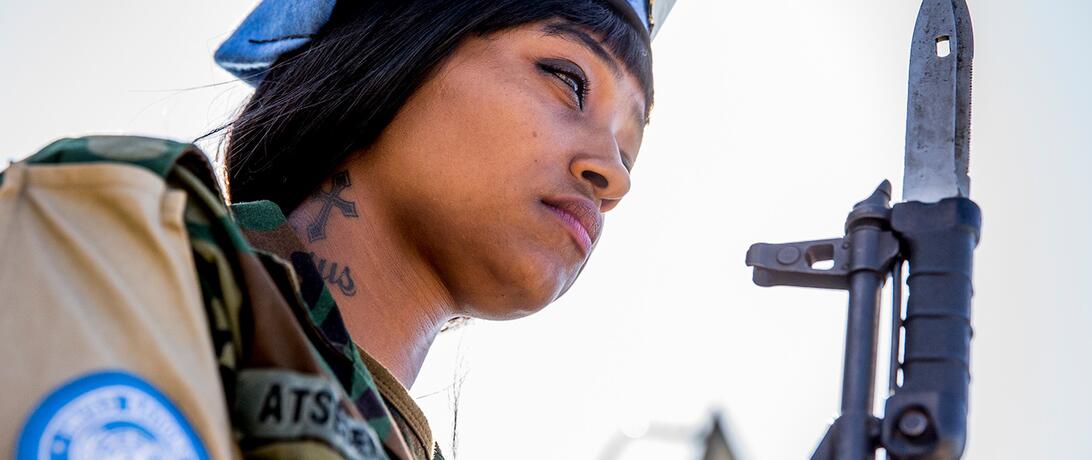
There is also a growing body of work on the participation of women in peacekeeping forces for improved intelligence gathering, a critical component to a successful peacekeeping operation.
Nearly two decades since UNSCR 1325, the deployment of uniformed women peacekeepers has risen from 1% to just 3%, just shy of 4,000 women total. Clearly, much work remains to be done to improve the recruitment and retention of women in UN peacekeeping forces. It is critical to the future of peace and security operations that the recruitment and participation of women in peacekeeping forces expands, to improve information gathering, increase credibility with the local population, and enhance protection through increased legitimacy. There is also a growing body of work on the participation of women in peacekeeping forces for improved intelligence gathering, a critical component to a successful peacekeeping operation.
Women are critical to improving the effectiveness of intelligence gathering in peacekeeping operations. Female military observers often have more access to affected populations, and have the ability and stronger inclination to liaise with women in the area. Liaising with both men and women gives intelligence operators a more nuanced picture of the security situation on the ground.
Mixed Gender Teams can Gather Intelligence From the Whole Population
The broader the cross section of actors providing data and information, the more sophisticated the picture on the ground will be, as demonstrated in a study done on five Provincial Reconstruction Teams in Afghanistan. In the case of Afghanistan, deployed men were prohibited from communicating with local women, shutting out the possibility of collecting important intelligence from half of the local population. Female engagement teams proved to be critical. The same lessons can be applied to peacekeeping operations - female military observers improve data gathering because they have better access to a greater segment of populations, especially in culturally and religiously sensitive regions.
Affected Populations are more Forthcoming With Female Peacekeepers
In conflict or post-conflict contexts, affected populations are more likely to communicate with female peacekeepers on sensitive issues, such as sexual violence. It has been reported that men and women are more forthcoming with information when speaking with female peacekeepers, specifically in regards to sexual violence. Women and girls are expected to be more forthcoming with female peacekeepers, especially in regions where interaction with foreign men is culturally or religiously taboo and discussion of sexual assault unthinkable. Male victims of sexual violence face additional layers of taboo and humiliation, and are more likely to provide information on sexual violence to a female than a male peacekeeper.
Mixed-gender patrol teams are strengthened by the diversity of perception in peacekeeping operations. Female peacekeepers may see things overlooked by male peacekeepers, drawing on their own experiences in various roles women frequently inhabit in community organization. Male peacekeepers may not think to liaise with women, may not know how to appropriately interact with local women, or be culturally or religiously prohibited from doing so. Female peacekeepers may be able to break through those cultural and psychological barriers much more easily.
Trustworthy Information Starts with Trusting Relationships
Trust between affected populations and peacekeepers is at the core of sharing and gaining reliable information. Female military observers have had more success with gaining the trust of local populations, a vital component to all aspects of a peacekeeping operation, and namely for intelligence gathering. Liaising with women in peacekeeping situations is critical to holistic intelligence gathering, which may only be possible with the presence of female peacekeepers to break through the affected population’s feelings of mistrust.
There are limits to relying too heavily on intelligence gathered on patrols. Civilians may be feeding peacekeeping forces unreliable, false intelligence for other strategic gains, especially in environments where multiple forces are in conflict and civilians are politically engaged for the victory of a certain group. Peacekeeping forces do not always have the organizational resources to conduct proper vetting of information gathered, including cross corroboration, and calling into question the reliability or usability of the intelligence. And finally, it is unclear as to how information gathered from human sources by peacekeepers should be properly used to inform policy making and strategic design of peacekeeping operations.
Article Details
Published
Topic
Program
Content Type
Opinion & Insights